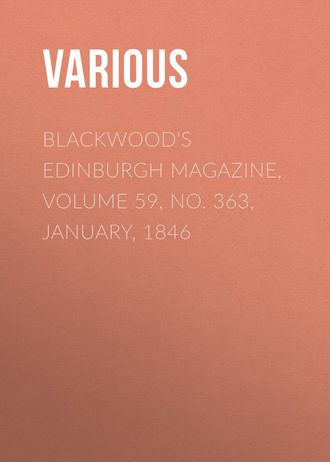 полная версия
полная версияBlackwood's Edinburgh Magazine, Volume 59, No. 363, January, 1846
We had written thus far, in the belief that the Whigs, though after some coy, reluctant, amorous delay, would succeed in forming a sort of government – a task which we were sure Lord John Russell would attempt. That result seems now more than doubtful, and we close this article in the anticipation that a Conservative cabinet may possibly be again in power, before these pages meet the eyes of our readers. We rejoice at the prospect, and the country will rejoice. Good measures from good men is the best consummation of political well-doing, as it is certain that dangerous measures from dangerous and desperate men, is the most fearful political evil. In any view our friends have a plain course. It is, to adhere to their principles with a firm, yet prudent, determination of purpose – to hope and believe the best of their leaders and party – and to await patiently, and receive candidly, the elucidation of those things that have hitherto been a mystery; and, as to which, as it was impossible to make any explanations, so it was unjust to pronounce a decision. We earnestly pray that, whether in power or in opposition, the meeting of Parliament will see among our great Conservative statesmen, and their followers throughout the country, including the new adherents whom the rashness and recklessness of our opponents have necessarily gained for us, that solid union of opinion and vigorous co-operation of action, on safe and sound principles of legislation, which can alone terminate the crisis and avert its recurrence.
1
This has been recently the subject of a decision of the Court of Queen's Bench, in the case of Egan v. The Guardians of the Kensington Union, 3 Queen's Bench Reports, p. 935, note (a). The same rule applies to physicians. Veitch v. Russell, ib. 928.
2
Leading counsel, indeed all counsel much engaged in business, necessarily place their time almost altogether at the disposal of their clerks, whose duty it is to keep an exact record of their employer's engagements, and see that no incompatible ones are made for him. Counsel find quite enough to do, in adequately attending to the matters actually put before them by their clerks, without being harassed by adjusting the very troublesome arrangements and appointments, for time and place, where their duties are to be performed or, at all events, doing more than keeping a general superintendence over their arrangements thus made. To all this must be added those innumerable contingencies in the arrangements of the courts, and the course of business, which no one can possibly foresee; and which often derange a whole series of arrangements, however cautiously and prudently made, and render counsel unable, after having carefully mastered their cases, to attend at the trial or argument.
3
The clerk of a barrister has a fee on every fee of his employer, in a long-settled proportion of 2s. 6d. on all fees under five guineas; from, and inclusive of five guineas, up to ten guineas, 5s.; from ten guineas, 10s., and so on for higher fees.
4
Phil. c. vi. sec. 7.
5
Adapted from Edmund Burke.
6
Sir Walter Raleigh —History of the World, last paragraph.
7
Fahrten und Schicksale eines Deutschen in Texas. Von H. Ehrenberg. Leipzig: 1845.
8
The founder of the American colonies in Texas, and father of Stephen F. Austin.
9
The arms of Mexico are a cactus, with as many leaves as there are states of the republic.
10
The first wrote eighteen hundred plays, the variety in the plots of which is so prodigious, that they are the great quarry from which almost all subsequent dramatic writers have borrowed the elements of their theatrical pieces.
11
Euripides was fifteen years younger than Sophocles – the latter being born in the year 495 b. c., the former in 480; and they thrice contended for the prize at the public games of Greece.
12
Miss Cushman's Lady Macbeth is a performance of the very highest merit, and proves that the genius of the stage is capable of being matured in transatlantic climes.
13
At the execution of Doolan and another, for a combination murder near Glasgow, on May 13th, 1842.
14
Schiller's dramas are of the modern kind, and the unities are not strictly observed; but his finer pieces belong more nearly to the Grecian than the Romantic school.









